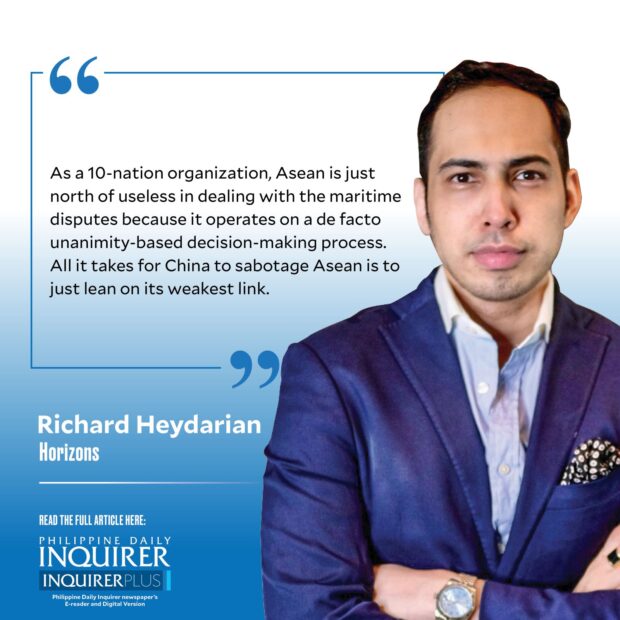Asean minilateralism: A PH-Vietnam alliance?

They say the whole is greater than the sum of its parts. But when it comes to the Association of Southeast Asian Nations (Asean), it’s often the exact opposite: the sum of some parts is greater than the whole. This is particularly true when it comes to the West Philippine Sea disputes.
In fairness, Asean nations managed to issue an unprecedented standalone statement on the escalating tensions between the Philippines and China over the Second Thomas Shoal last year. Asean foreign ministers expressed “concern” and called on rival claimants to “exercise self-restraint” and “avoid actions that may further complicate the situation.” They also expressed “solidarity” and “unity” while characterizing the South China Sea as “our [common] maritime sphere.”
In effect, the regional body rejected China’s claims on three levels: namely, that (i) the situation is “generally stable” in the disputed waters; that (ii) it exercises “indisputable sovereignty” over the bulk of the South China Sea basin; and that (iii) the disputes are primarily bilateral issues between rival claimants.
Article continues after this advertisementBut the regional body didn’t even dare to openly name or call out China’s bullying of a founding member, the Philippines. Moreover, Asean has willingly been taken for a ride by China in the seemingly never-ending Code of Conduct (COC) negotiations in the South China Sea.
As a 10-nation organization, Asean is just north of useless in dealing with the maritime disputes because it operates on a de facto unanimity-based decision-making process. All it takes for China to sabotage Asean is to just lean on its weakest link. This stands in stark contrast to the Cold War period when the original members of Asean managed to effectively coordinate their responses to major crises.
In fact, the earlier iteration of Asean was particularly effective when it operated on a “minilateral” basis, namely ad-hoc, issue-specific cooperation among key member states. This was particularly the case when several Southeast Asian nations actively assisted East Timor’s transition into a sovereign democracy in the twilight years of the 20th century.
Article continues after this advertisementThe combination of three factors, however, has made Asean an increasingly toothless organization when it comes to dealing with high-stakes security issues: (i) absence of visionary and decisive leaders, who could sustain cooperation on a regional level; (ii) rapid and incongruous expansion of the regional body without much institutional preparation; and (iii) the remarkable ascent of China as a regional economic hegemon in the early 21st century.
And this is why President Marcos’ visit to Vietnam this week is extremely important. Of all Asean nations, the Philippines and Vietnam have the greatest potential as rising middle powers as well as security partners (Indonesia is already a globally influential middle power).
Up to 90 percent of our rice imports come from Vietnam, thus making our Asean neighbor a vital food security partner. Vietnam’s remarkable success in building a world-class manufacturing sector can also serve as an inspiration for Mr. Marcos’ emerging industrial-investment strategy.
The two Asean members also share similar concerns and threat perceptions in the South China Sea. Lest we forget, Vietnam was the only Southeast Asian state to openly back our arbitration case against China in the South China Sea—and was already exploring a strong security partnership with the Philippines during the Benigno Aquino III administration.
Our election of a pro-China demagogue in 2016, however, torpedoed the budding Philippine-Vietnam alliance. But under Mr. Marcos, the Philippines is once again trying to explore closer cooperation with Vietnam. In particular, the two sides seek to finalize a vital agreement, which would boost maritime security cooperation between the region’s two fastest-growing economies.
Moreover, the Philippines and Vietnam will likely step up their diplomatic coordination within and beyond Asean to ensure that the South China Sea disputes are managed, if not resolved, through the United Nations Convention on the Law of the Sea rather than Beijing’s bogus doctrines. A mini-COC among Asean claimant states will also likely be discussed.
Given Vietnam’s deepening economic reliance on China, and its staunchly nonaligned national security doctrine, it will likely shun a full-fledged security partnership. But Vietnam can become a pivotal component of “Asean minilateral” cooperation on the South China Sea disputes in tandem with us, Indonesia, Malaysia, and Singapore.
rheydarian@inquirer.com.ph
















